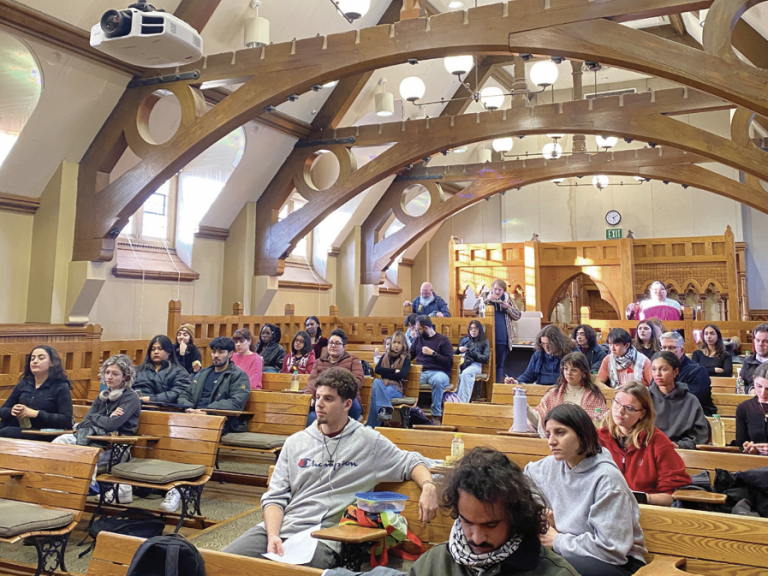Cornelia Ehlebracht ’25
News Editor
On Tuesday, April 2, 2024, Trinity College Hillel and the Jewish Studies Department co-sponsored a talk by Sarah Hurwitz, “A Jewish Journey in the White House and Beyond.” Sarah Hurwitz has an impressive career in political speechwriting, beginning in 1998 when she interned in Vice President Al Gore’s speechwriting office after graduating from Harvard Law.
Hurwitz said, “the reality is I got [this job] through a lot of failure.” Before working in the White House, she served as chief speech writer for Hillary Clinton on her 2008 presidential campaign. Hurwitz’s association with the Obamas started when she was offered a senior speechwriting position for then-Senator Barack Obama’s presidential campaign shortly after Clinton conceded. After working as a senior speechwriter for President Obama from 2009 to 2010, Hurwitz advanced to the role of head speechwriter for First Lady Michelle Obama, with whom she developed a deep connection, holding that position from 2010 to 2017.
After her tenure as a speechwriter, Hurwitz embarked on a personal spiritual journey that led her to write “Here All Along: Finding Meaning, Spirituality, and a Deeper Connection to Life — in Judaism (After Finally Choosing to Look There).” In this book, she explores her rediscovery of Judaism and the transformative experiences that accompanied it. Hurwitz identified a core idea of Judaism she believes is relevant to all our lives today: “We are all created in the image of God… you can’t put a price on human life.” According to Hurwitz, this fundamental pillar of Judaism reinforces the idea that no one’s value is greater or lesser than another’s, each person is considered of immeasurable worth and the essence of their uniqueness is celebrated.
Published on Nov. 10, 2023, in SAPIR Journal, Hurwitz wrote a letter titled “To Jewish College Students Who Are Scared,” regarding reports from Jewish students of ostracization, discrimination and abuse in response to the Israel-Palestine conflict. Hurwitz is currently touring college campuses across the country visiting Hillels to understand Jewish student’s challenges in this current political climate. She describes two kinds of antisemitism: “The first kind is ‘the Jews are bad and we have to kill them, or assault them or oppress them and there is nothing the Jews can do to be okay’… [The second] kind of antisemitism is the ‘Jews are bad, but there is something that they can do to be good’… they can disavow whatever aspect of Jewish civilization that the majority finds disgusting and then they are okay.” Hurwitz argues that due to the Israel-Palestine conflict, “Today, the demand is you have to disavow your ancestral homeland of Israel, once you disavow Israel then you are a ‘good Jew’… the majority is deciding how you are to be a Jew.” Hurwitz characterizes this as a contemporary form of forced conversion where individuals are compelled to conform to a particular definition of Jewishness deemed by the prevailing majority.
Alexander Nadelberg ’26, the President of Trinity Hillel, shed light on the challenges faced by Jewish students on campus and emphasized the importance of fostering a climate of inclusion and respectful dialogue.
Nadelberg said, “We hoped to provide support to Jewish students by bringing a speaker with a Jewish perspective on campus that has often been missing from campus conversations in recent months… There have been a number of hate-filled and antisemitic messages targeting individual members of Hillel on their private social media accounts and on Trinity Hillel as a collective.” Nadelberg asserts Trinity Hillel seeks a return to a campus climate of inclusion, where Jewish students feel embraced rather than excluded.“Jewish students are eager to engage in respectful dialogue across differences and engage in kind and thoughtful conversations, even and especially when our views may differ.”
Through conversations and speechwriting for Michelle Obama, a woman with a completely different racial and religious background than herself, Hurwitz was able to understand her perspective and affirmed that “being her speechwriter was really about channeling her.” Hurwitz encouraged Trinity College students to approach conversations about the Israel-Palestine conflict with the same empathy and understanding.





+ There are no comments
Add yours